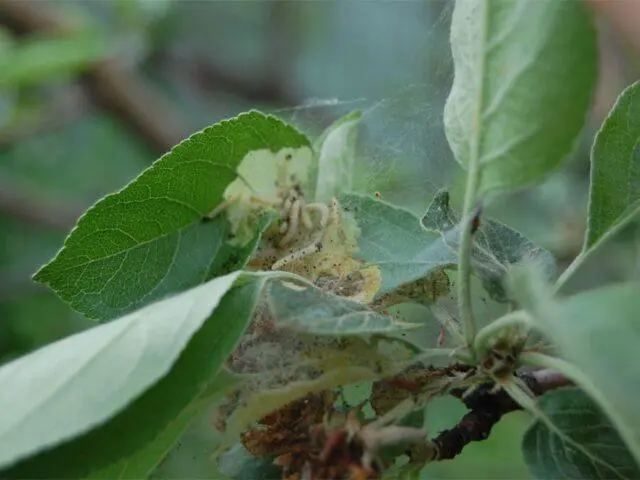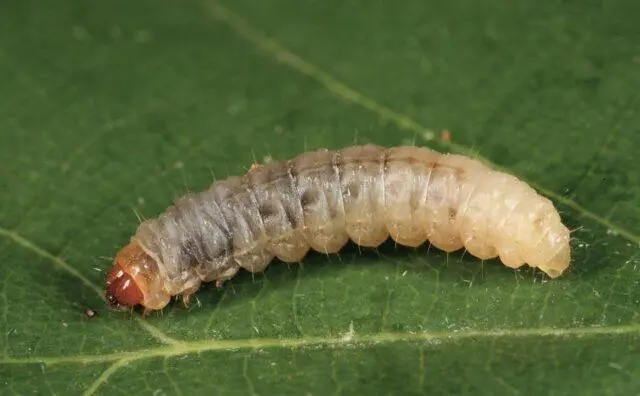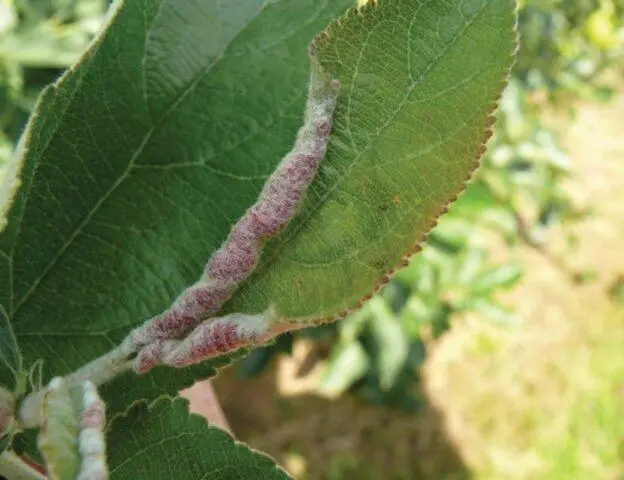Contents
- How an ornamental apple tree blooms
- Varieties of decorative apple trees with descriptions and photos
- Varieties and description of decorative apple trees with red leaves
- Varieties of ornamental apple trees for the Moscow region
- How to plant an ornamental apple tree
- Propagation of ornamental apple trees
- How to form a decorative apple tree
- Pest Control
- What to plant next to an ornamental apple tree
- Photo of decorative apple trees in the landscape design of the garden
- Conclusion
The ornamental apple tree is represented by a large number of hardy and attractive varieties. To understand which tree is best to plant on the site, you need to study the popular species.
How an ornamental apple tree blooms
The ornamental apple tree blooms annually, most often in early or mid-summer. The buds of the plant have a wide variety of shades depending on the variety and can be white, light pink, carmine red and crimson purple. Flowering culture usually lasts at least two weeks.
At the end of the decorative period, the plant forms fruits, but they are not of particular value. Apples are too small, only up to 4 cm in diameter, have a bitter-sour, unpleasant taste. Their purpose is mainly decorative – the fruits are bright and plentiful, do not crumble after ripening and remain on the shoots for a long time.
Varieties of decorative apple trees with descriptions and photos
Types of ornamental apple trees differ in timing and characteristics of flowering. In particular, it is customary to distinguish several varieties.
Everest
Decorative variety Everest (Everest) has a spreading crown, the leaves of the plant are green, with a matte surface. During the flowering period, it blooms with white buds with pink stripes on the petals.
The fruits of the Everest apple variety are small, orange or reddish. They stay on the branches until the very cold weather and increase the decorativeness of the plant.
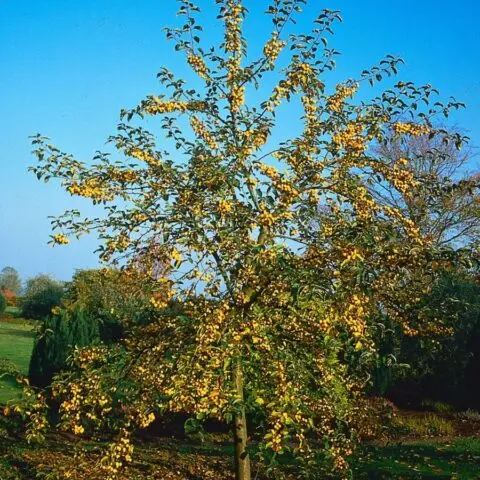
Variety Everest reaches its peak of decorativeness at the end of May
Golden Hornet
Medium-sized variety Golden Hornet (Golden Hornet) with a dense crown and hanging branches emits a pleasant sweetish aroma during flowering. It blooms in white-pink buds, brings numerous yellow small fruits. Apples are quite edible, but their taste is not the most pleasant, so they are usually not used for food purposes.
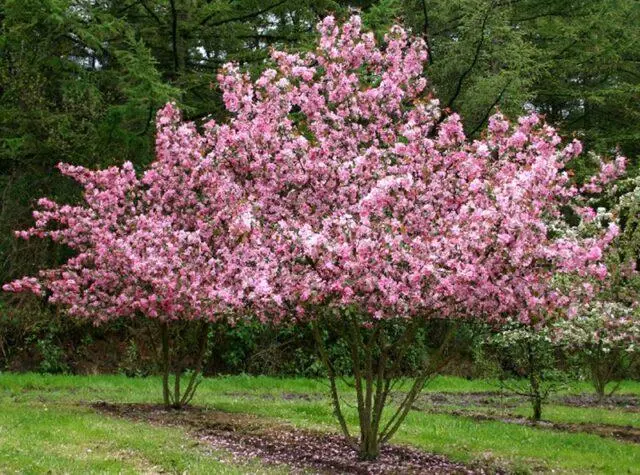
Variety Golden Hornet grows up to an average of 4,5 m
Long
Apple tree Chinese, Long or Long (Dolgo) – a low tree with beautiful glossy leaves and large white flowers. The fruits of the variety are very small, green at the beginning of ripening, gradually turn yellow and acquire red barrels with a bluish bloom. There is a pronounced sourness in the taste of apples. They are not eaten fresh, but are sometimes used in the preparation of compotes and wines.
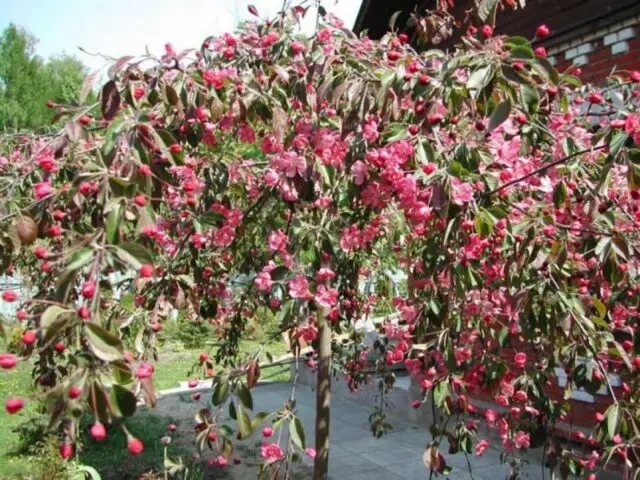
Variety Long during the flowering period exudes a plum aroma
Rudolph
The beautiful ornamental apple tree Rudolph is a multi-stemmed low shrub with dark green leaves. It produces small light pink buds in spring, and in autumn it produces bright yellow small fruits. Apples adorn the plant until the cold weather. The variety is characterized by increased endurance and does not require complex care.
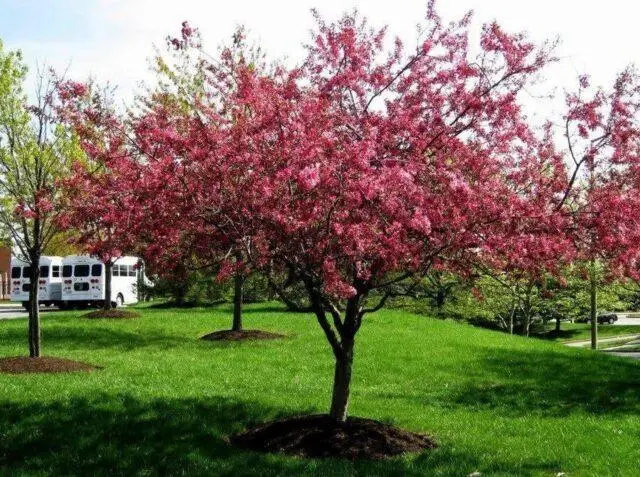
Variety Rudolph is recommended to be planted in brightly lit areas.
Profession
Decorative apple tree Profusion (Profusion) has a spreading crown with oval maroon leaves. The buds of the plant are white, stay on the branches for only about a week, but after shedding they are replaced by new ones throughout the spring. Small fruits with velvety skin adorn the shoots from the beginning to the end of summer.
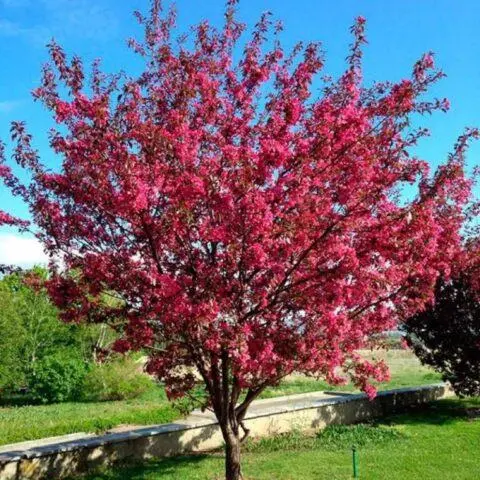
Apple variety Profusion spreads up to 5 m in diameter
weeping
Weeping apple tree (Pendula) has drooping shoots that form a dense crown. The branches of the plant are thin and flexible, the flowers are small pale pink. At the end of the decorative period, red compact fruits form on the shoots. They do not have valuable taste qualities.
It is better to plant an ornamental culture in a sunny place. The plant loves good moisture and requires regular watering in drought.
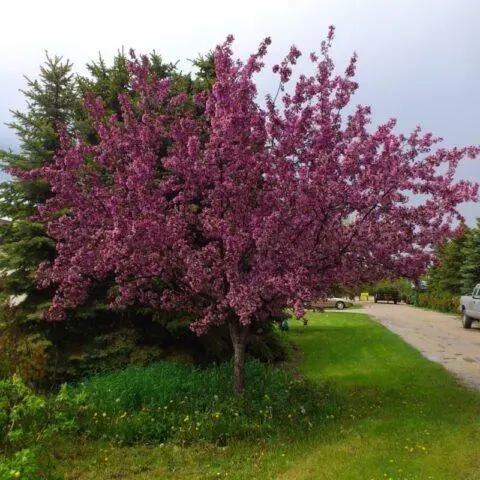
Weeping apple tree grows up to 2,5 m above the ground
Robin
Robin, or Suislepa apple (Suislepa) is an ornamental variety with a dense rounded crown and beautiful crimson buds. During the flowering period, it becomes very similar to sakura. At the end of summer it brings small dark red fruits with average taste, it is used in the preparation of blanks.
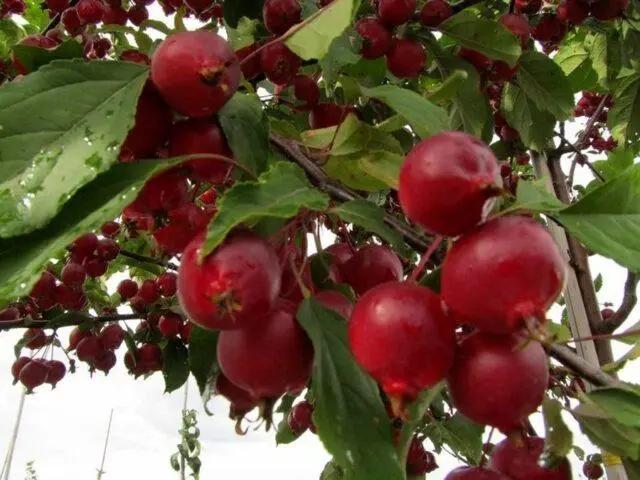
Malinovka apple tree is sensitive to waterlogging and fungal diseases
Scarlet
Decorative variety Scarlett (Scarlett) reaches about 4 m in height. The crown of the apple tree is sparse, round or columnar, the leaves are green with a reddish tint. The flowers of the tree are light or dark pink, densely cover the shoots.
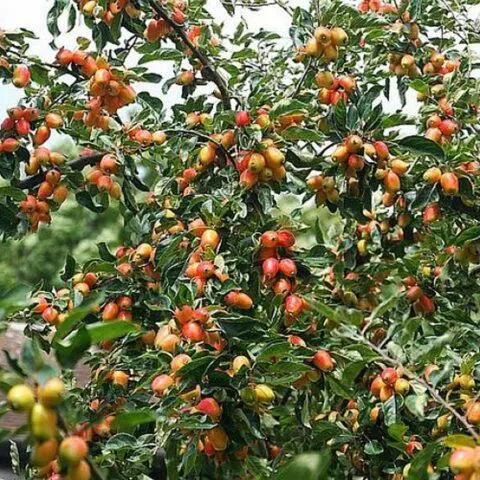
Decorative apple variety Scarlet blooms profusely in May
Red Obelisk
Decorative variety Red Obelisk (Red Obelisk) is distinguished by a red tint of leaves and a columnar crown of medium spreading. It blooms in small pink buds, densely covering the branches. Fruits are numerous, but small, yellow or red.
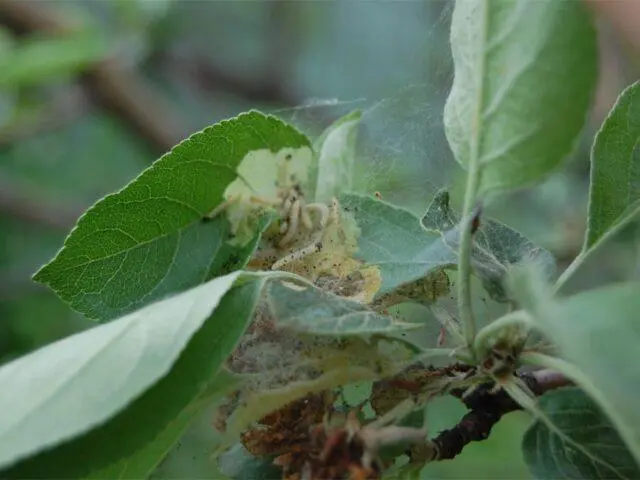
The fruits of the Red Obelisk apple tree remain on the shoots until frost
Royalty
The beautiful Royalty apple tree with purple leaves blooms in spring with numerous pink buds. In summer, the plates of the ornamental variety turn green with a slight purple tint. Closer to autumn, the tree bears crimson-red small fruits, which remain on the branches until the middle of winter.

Apple variety Royalty requires frequent pruning
Varieties and description of decorative apple trees with red leaves
Red-leaved varieties of ornamental apple trees look especially interesting on the site. Plants remain highly attractive throughout the season.
Makovetsky (Makowieckiana)
An ornamental tree up to 2 m tall has an even spherical crown. The branches of the plant are burgundy, the leaves are red at first, and then become dark green with a brownish tint. The variety blooms with pink buds in May and June, retains its decorative effect for about two weeks. The fruits of the apple tree are bright red, used in the manufacture of jams and preserves.
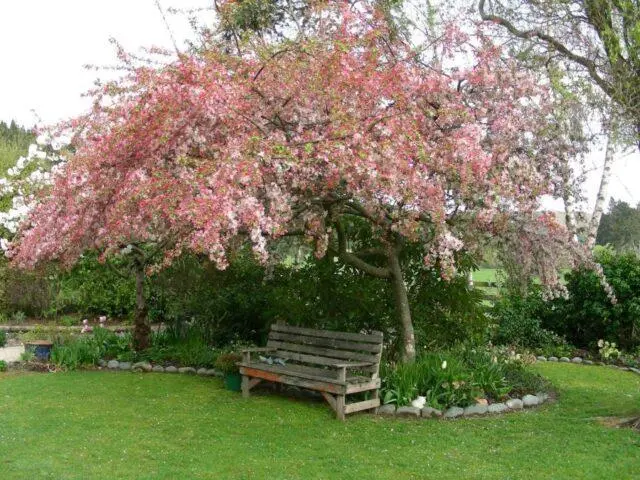
In diameter, the Makovetsky apple tree spreads up to 4 m
Helena
An ornamental plant up to 4 m tall with a lush spreading crown reaches its maximum dimensions by the age of ten. It blooms profusely in spring, in early summer it bears numerous red fruits that do not fall until autumn. The branches of the decorative variety are crimson, the leaves are elongated, glossy, raspberry-pink.
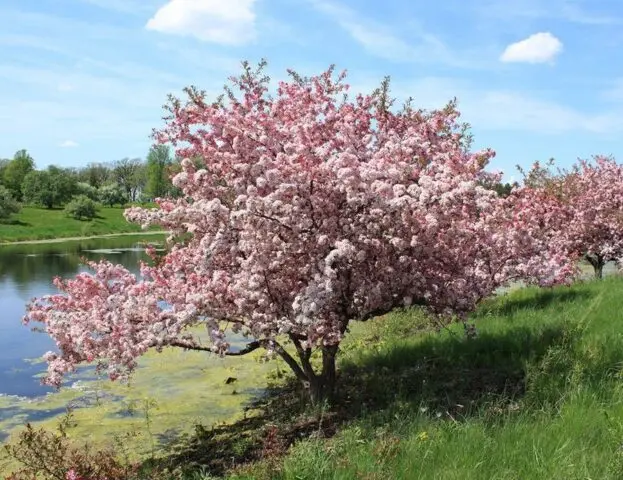
Variety Helena is well suited for growing in areas with unfavorable ecology.
Royal Beauty
A frost-resistant variety of an ornamental apple tree with red leaves grows up to 2,5-3 m and spreads up to 4 m wide. The shape of the crown is usually weeping or umbrella-shaped. The flowering of the variety begins in May and lasts about two weeks, the buds are dark pink, bright and plentiful.
In summer, small red fruits form on the branches. They fully ripen in September, but their taste is bitter and unpleasant.
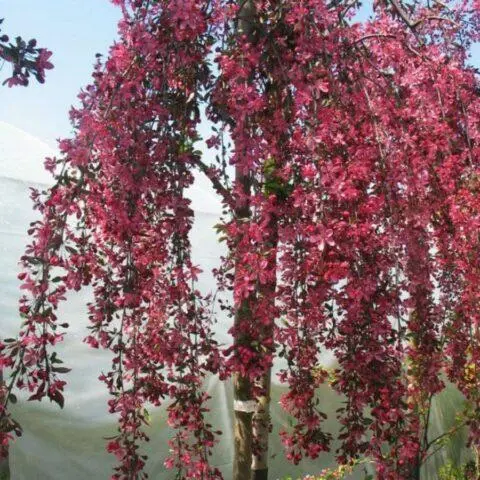
Royal Beauty variety tolerates cold down to -35 ° С
Varieties of ornamental apple trees for the Moscow region
When choosing an ornamental variety for the Moscow region, it is necessary to take into account the characteristics of the region. The apple tree must have high frost resistance and good tolerance for excess moisture.
Makamik
A medium-sized ornamental apple tree up to 7 m above the ground has a well-developed domed crown. It grows successfully in the middle lane and in the Moscow region, it is poorly suited for the Urals and Siberia. Prefers sunny places and fertile moist soils. The leaves of the ornamental variety are reddish-green, the flowers are purple and very plentiful.
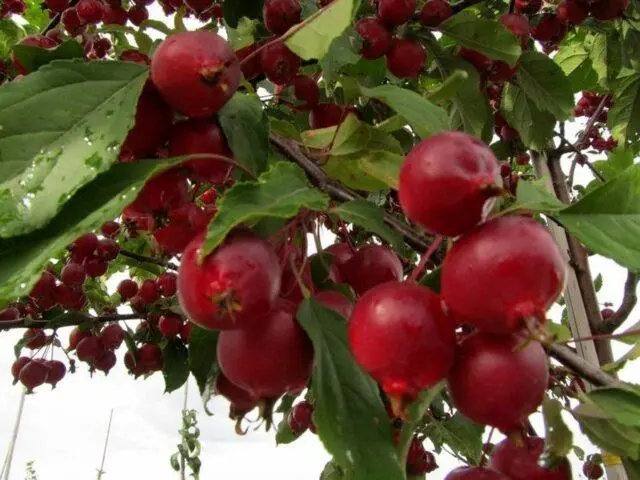
Makamik apples are suitable for making compotes and jams
Lisette (Lisette)
An ornamental variety of an apple tree rises on average up to 5 m, it is a sprawling shrub or a low tree. The flowers of the plant are red with a bluish tint, the fruits have a rich pomegranate hue. At a young age, the variety has a rounded compact crown, then the branches droop slightly.
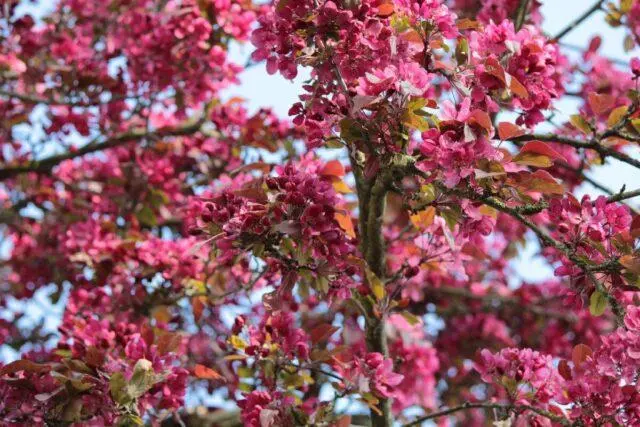
Decorative variety Liset blooms most abundantly in early May
John Downey (John Downie)
The decorative apple tree belongs to tall varieties and reaches an average of 5-10 m. The crown of the tree is narrow at first, then grows to 3-6 m in diameter. The leaves are shiny dark green, the buds are white, collected in compact inflorescences.
The peak of decorativeness of the variety falls on mid-May. The fruits ripen in the second decade of September and remain on the branches until frost.
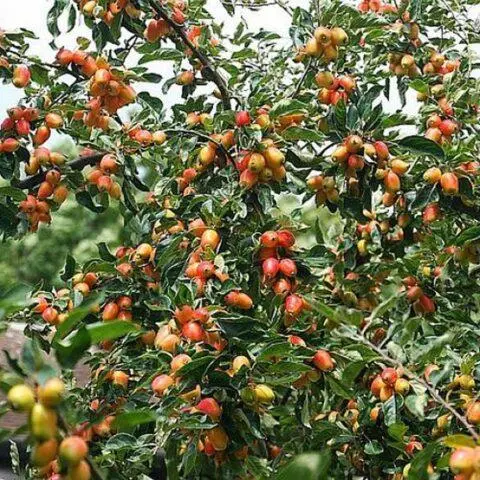
Decorative apple tree John Downey withstands frosts down to -30 ° C
How to plant an ornamental apple tree
Planting an ornamental apple tree in the spring is not associated with great difficulties. First of all, for the culture you need to find a suitable place. The plant prefers neutral and slightly acidic soils rich in organic matter. Best of all, the apple tree develops in lighted areas, covered from the wind and cold drafts.
The direct procedure for planting a plant is as follows:
- At the selected site, they dig a hole up to 60 cm deep.
- Half fill with a soil mixture of leafy earth, humus and sand.
- About 500 g of wood ash and some mineral fertilizers are brought into the hole.
- Gently lower the seedling in the center of the pit and cover it with the rest of the soil.
After planting, the decorative apple tree should be watered abundantly and mulched with straw. When placing several plants on the site, 2,5-3 m of free space is left between them.
Propagation of ornamental apple trees
There are several ways to increase the population of a plant on a site:
- Seeds. It is allowed to use purchased or self-assembled material. Seeds are sown in the fall immediately after harvesting, or they are first stratified for about two months, and then planted at home.
- cuttings. From an adult healthy plant, several flexible shoots are cut and rooted in water or in a nutrient substrate. For the first couple of years, it is recommended to keep seedlings in a temporary area.
- Inoculation. When propagating rare valuable varieties, young shoots of an apple tree are fixed on a rootstock. The procedure is carried out in early spring before the start of active vegetation.
Most often, grafting or the seed method is used to propagate the culture. Cuttings of an ornamental apple tree take root poorly, the survival rate is only about 15%.
How to form a decorative apple tree
Decorative pruning of apple trees is carried out in late autumn or early spring. The plant must be at rest, otherwise the procedure will harm it. When performing pruning, adhere to the following rules:
- In the second year of life, the central conductor is cut off from the plant and the lateral shoots directed downwards are completely removed.
- The next season, the main branch is shortened by 10 cm.
- Trim the side shoots by about 20 cm.
- In the fourth year, the crown is thinned out and all weak and twisted branches are removed.
- For the fifth season, the crown of the ornamental culture is cut to slow down vertical growth.
An adult tree needs mainly sanitary cutting, aimed at removing broken, dry and diseased branches. In the course of decorative pruning of a red-leaved apple tree, it is recommended to pinch young shoots to maintain a neat outline of the crown.

When growing ornamental apple trees, it is necessary to regularly remove shoots older than 3-4 years
Pest Control
The decorative apple tree is resistant to fungal diseases, but is often affected by pests. The danger for her is:
- leafworm – an insect settles on leaves along the central vein or next to the ovary;

The leaf roller is active in late May and early summer.
- codling moth – the pest eats away ripening apples from the inside and reduces their decorative effect;

The apple codling moth poses the greatest danger in the southern regions.
- spider mite – an insect has a red or brown body, feeds on the leaves of the culture and causes them to fall off;

The spider mite appears en masse on the apple tree from late spring to mid-summer.
- leaf gall midge – the pest eats young plates, they quickly deform and dry out.

The gall midge causes maximum damage to the apple tree in late June and July.
To prevent crop damage by insects, it is necessary to regularly inspect the shoots and leaves throughout the growing season. With a weak defeat of the apple tree, the tree can be sprayed with home-made products – soapy water, garlic or onion broth. If there are a lot of pests, it is better to resort to acaricides – Neoron, Sunmite, Arrivo and the like. Processing is carried out according to the instructions at least three times per season.
What to plant next to an ornamental apple tree
In landscape design, a red ornamental apple tree and green leaf varieties are often combined with other crops. The best neighbors for a plant are:
- berry bushes – raspberries and blackberries;
- peonies and irises;
- strawberries, yaskolka and daisies;
- lemongrass, blackthorn and parthenocissus;
- hops and Japanese quince.
You can combine an ornamental apple tree with fieldfare and barberry – cultures look especially impressive next to red-leaved varieties. A successful element of the group composition will be lilac.
Photo of decorative apple trees in the landscape design of the garden
Decorative varieties of apple trees with red flowers are widely used in landscape design. Most often, culture is used to form small alleys in the garden. Medium-sized trees look good when planted along paths or at the entrance to the site.
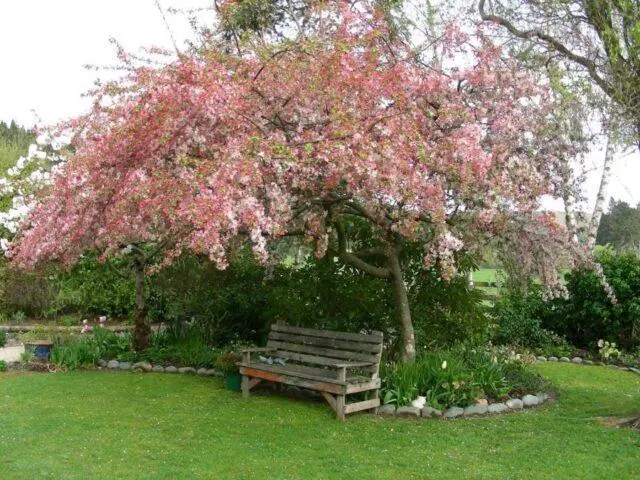
Decorative apple tree creates a pleasant diffused shade in the garden on hot days.
Low varieties are often planted near fences and house facades next to conifers and flowering perennials. The apple tree helps to decorate the empty space and at the same time is reliably protected from strong winds and cold drafts.

You need to plant an apple tree not close to the facade, but with an indent of 2-3 m
A low decorative tree looks beautiful next to artificial reservoirs. Culture is used to create Japanese gardens. A neat composition retains its attractiveness, including in the cold season – snow forms thick caps on spreading or drooping apple branches.
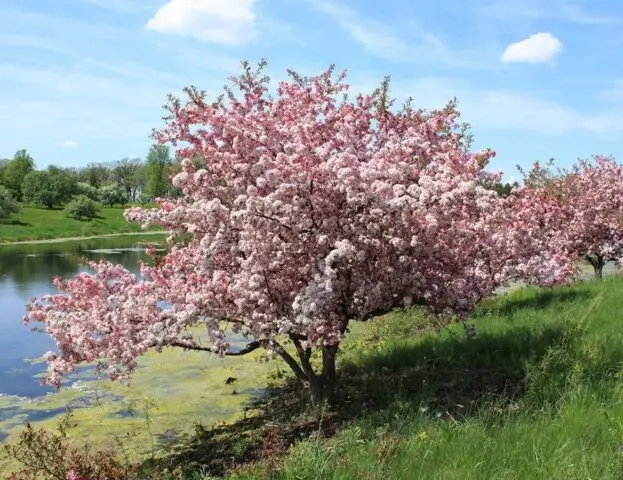
When planting an ornamental apple tree near water, you need to make sure that the soil does not become swampy.
Conclusion
Ornamental apple tree is an interesting variety of culture with attractive leaves and buds. The fruits of the plant are very abundant, brightly decorate the shoots for most of the summer. But they usually have no nutritional value.











